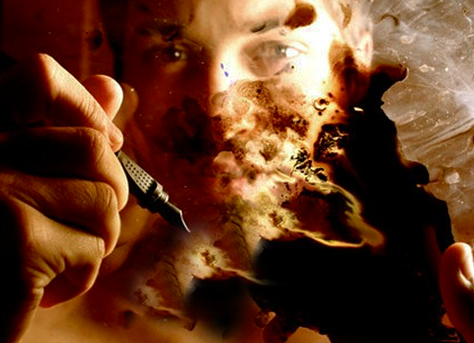Writing, you are a magnificent tool.
You enable me to release pent-up emotion.
You give me strength when I feel weak.
You let me say what needs to be said.
You help me clarify my thoughts.
You imagine a new world with me.
I began writing soon after I began reading, much for the same reasons—home was chaos. What I called home was an evershifting sand with adults who looked like sad puppets. At least books made sense. I trusted that the characters said what they meant. Meaning was intelligible in stories, because they were crafted to give you just that.
I read everything I could get my hands on: Malorie Blackman, Enid Blyton, Agatha Christie, Stories for 10 Year Olds, J.K. Rowling, and Philip Pullman. Then more sophisticated writers as I grew up, like Shakespeare and Dickens. I went on to read English Literature at university, not fully knowing what would be required of me in my studies. I ended up filling my brain with so many words by so many other people—all picked and pulled apart—that my once safe haven, my joy of reading, became menacing.
Books were for studying and analysing, not for pleasure. And especially not for escape. I was required to respond to books with academic essays highlighting themes, hidden meanings, and trajectories. All I wanted to do was curl up with a book and let it transport me, not skim through page after page and rush to make my interpretation intelligible in the space of a week.
Writing became a chore. It became dangerous. I couldn’t say what was on my mind clearly anymore. I turned to poetry and still I wrote in an academic slant, eschewing popular culture and conventional ways of writing because they weren’t clever enough. It was around this time that I had a series of breakdowns. I was adamant that I would keep it all together. University was a safer space for me than home. The thought of taking a year out was like a death sentence, so I learned how to simplify everything from the confines of my bed.
At the time, I had started keeping a journal. I was shocked by all the words that spilled out. There was so much I needed to say. Many emotions that had been bottled up for so long. I was afraid of what I might write. All the while, my reality was shifting as I became more aware of my dissociated state, and suffered more from chronic anxiety and pains all over my body. Writing held me in place. While it shocked me to write my often vehement and self-effacing thoughts, it was the best way of grounding me in my new reality.
Writing became my anchor, although it showed me all of my holes. The writing style I had been cultivating at university (the University of Cambridge, no less) was cool and aloof. In fact, I was cool and aloof. I had not yet learned how to be honest with my emotions, and I was being shown a way out through words. My words. My diary of expressive, painful, grotesque, elevated words.
It took great strength for me to delve into my own emotional writing, while at the same time maintaining a level of propriety for my academic work. I filled pages and pages of notebooks with my suffering. I maintained such an acute sense of privacy about my inner world that even the people around me could only catch a glimpse of the truth. Even I could only glimpse the truth, as I was a stranger even to myself. The words showed me that.
These notebooks are in storage now, some of them destroyed, and looking back I still don’t have a name for what happened. Some call it the dark night of the soul, but who has that at 23? All I know is that I was on a hamster wheel, living in a delusion of reality created by someone other than myself, and as soon as that bubble began to pop, oh, it popped! I am often shocked by my own presence, that I am still alive.
A friend of mine recently suggested that what I experienced was a mid-life crisis compressed into a quarter-life. True, I have often felt that my life experience feels a little much for my current, ripe age of 24. I had my partying and drug years compressed—intense years that altered my reality and created addictions, which I then struggled to kick (and did, successfully!).
I had my visits to healers. I had all of my beliefs run through a washing machine. I have walked around as if I were already dead. I have been bed-ridden, house-bound, diagnosed with chronic illness, and homeless. I have grieved the loss of friends that died too young. I have defied people who saw me through their own limited lens. I have shown myself the utmost compassion as parts of me wanted to override the whole of me and die.
But, to my friend, who wants to see me through his own limited lens, I did not suffer. For, he knows of people who have endured greater suffering, who have not escaped this suffering, and anyway, he says, suffering is a part of life. I find this amusing now, how he desires to tell me which words are and are not acceptable for my own lived experience. To him, the word “trauma” is more accurate. This may be so; however, in this moment, his attempts to connect with me flipped into arrogance.
In this tender moment, I justified my position and shared intimate details of my recent tribulations. I wondered, am I being goaded? What am I not seeing?
The way I describe my pain is no more interesting than my artwork or my approach to music, food, cinema, philosophy, travelling, or the fact that I love to gaze at trees silently for hours or go night-walking.
But, for those of us who have been in moments of acute pain, we can get stuck in roundabouts, seeing as the nature of suffering is to focus on oneself. We look outside of ourselves for validation, for someone to say, “I see you. I see where you have been and I accept you.” When we speak to other people with similar experiences, it is easy to think that we have been through something extremely similar, when perhaps it is not so.
For me, it is my writing that sees me. It is my writing that anchored me in my sea of chaos and my writing that liberated me from being stuck in one place.
It is in writing this now that I can accept this experience between my friend and I as a gentle nudge, a way of telling me not only to reassert my boundaries, but, also to show me an aspect of myself that was still externally looking for people, places, and things to validate my lived experience. When I thought I had let go, I was really holding on to my narrative for dear life, because it is in writing that I have been anchored. It is this same writing that keeps me connected to form—but now, I need to surrender to formlessness.
Instead of trying to understand darkness, let us try to find ways in conversation, a form of storytelling, to share our light. How we choose to do this is personal. I recognise how easy it is for spiritual or philosophical conversations to focus on our respective pasts, and the stories we most intimately know, instead of sharing simple joys.
Sometimes, our pain needs to be understood by an external being. And other times, by the blank page. If this resonates with you, then this article is for you.
The God within you knows enough of your tribulations and has already set you free.
The rest is left unwritten.
~


 Share on bsky
Share on bsky





Read 5 comments and reply